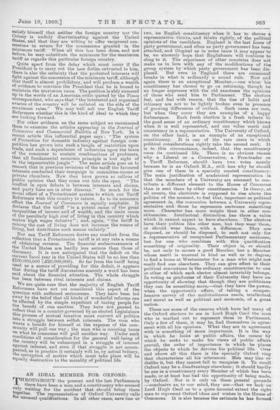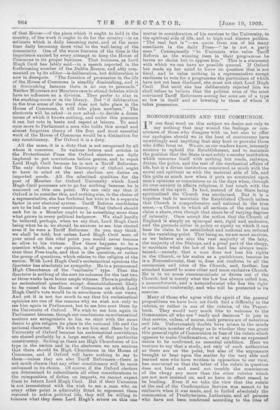AN IDEAL MEMBER FOR OXFORD.
THROUGHOUT the present and the last Parliaments there have been a man and a constituency who seemed only waiting for the accident that should bring them together. The representation of Oxford University calla for unusual qualifications. In all other cases; save one or two, an English constituency when it has to choose a representative thinks, and thinks rightly, of the political opinions of the candidate. England is the last home of party government, and often as party government has been attacked, and illogical as in some cases it may appear to be, we sincerely hope that Englishmen will continue to cling to it. The • experience of other countries does not make us in love with any of the modifications of the group system by which party government has been dis- placed. But even in England there are occasional breaks 'in what is ordinarily a sound rule. Now and again there is an exceptional Member,—one whom his constituency has chosen to go on returning, though he no longer expresses with the old exactness the opinions of those who send him to Parliament. The electors feel, and feel with reason, that the ties of habit and intimacy are not to be lightly broken even in presence of growing differences of outlook. Such cases are rare, but when they occur they are examples of a happy forbearance. Each fresh election is a fresh tribute to the good sense of an ordinary constituency which knows when it is well represented, and can value merit and consistency in a representative. Tho University of Oxford, on the other hand, is an example of an exceptional constituency. It is one of the rare cases in which political considerations rightly take the second rank. It is to this circumstance, indeed, that the constituency owes its continued life. There is no obvious reason why a Liberal or a Conservative, a Free-trader or a 'Tariff Reformer, should have two votes merely because he is an Oxford M.A., still less why he should give one of them in a specially created constituency. The main justification of academical representation is. that the members of a University are assumed to con- tribute a different element to the House of Commons than is sent there by other constituencies. In theory, at all events, the electorate is supposed to rise above the politics of the moment, to feel that, important as political agreement is, the connexion between a University repre, sentative and those ho represents embraces something, more. Character has more weight than in other con- stituencies. Intellectual distinction has there a value which it cannot expect to have elsewhere. The electors have their politics like other men, but they wear them,. or should wear them, with a difference. They are disposed, or should be disposed, to seek not only for a representative of recognised Parliamentary eminence, but for one who combines with this qualification something of originality.. Their object is, or should be, not only to secure a good Member, but a Member whose merit is unusual in kind as well as in degree,. to find a home at Westminster for a man who might not easily find one elsewhere. They can give effect to their political convictions in the ordinary constituencies to one or other of which each elector almost invariably belongs.. In voting as graduates of their University they have an opportunity of showing that though they are politicians they can be something more,—that they have the power, when the opportunity offers, of taking a compre- hensive survey of the multitudinous needs, intellectual. and moral as well as political and economic, of a, great nation.
These are some of the reasons which have led many of the Oxford electors to see in Lord Hugh Cecil the man who is marked out to represent them in Parliament. Only a few of them, it may be, find themselves in agree' ment with all his opinions. What they are in agreement with is something of more importance. It is the way in which he • looks at public affairs, the means by which he seeks to make his views of public affairs prevail, the order of importance in which • he places the objects to which he devotes his political life. Over and above all this there is the specially Oxford ring that characterises all his utterances. Men may like or dislike it, but they cannot fail to recognise it. To recall Oxford may be a disadvantage elsewhere; it should hardly be one in a constituency every Member of which has been made, or at least has had the opportunity of being made, by Oxford. Nor is it only on these general grounds —conclusive as; to our mind, they are—that we look on Lord Hugh Cecil as to a quite unusual extent the right man to represent Oxford ideas and wishes in the House of Commons. It is also because the estimate he has formed' of that House—of the place which it ought to hold in the country, of the work it ought to do for the country—is an estimate which is daily becoming rarer, and at the same time daily becoming more vital to the well-being of the community. One of the worst features of the time is the impatience excited by every attempt to keep the House of Commons to its proper business. That business, as Lord Hugh Cecil has lately said—in a speech reported iu the forthcoming number of the Dublin Review, and ably com- mented on by its editor—is deliberation, but deliberation is now in disrepute. "The function of persuasion in the life of the House of Commons is steadily diminishing, and it is diminishing because there is no one to persuade." Neither Ministers nor Members care to attend debates which have no influence on a division. They prefer to stay in the smoking-rooin or in the library. But " if deliberation in the true sense of the word does not take place in the House of Commons, it will take place nowhere." The electorate will be asked—is now asked—to decide a dozen issues of which it knows nothing, and under this pressure it can but vote in haste and repent at leisure. To send once more to Parliament a man who holds this sound and almost forgotten theory of the first and most essential work of the House of Commons would be a distinction for any constituency. For Oxford it is a duty.
All the same, it is a duty that is not recognised by all whom it concerns. In various letters and articles in the Protectionist Press the Oxford electors are daily implored to put convictions before genius, and to reject Lord Hugh Cecil because, he is not a Tariff Reformer. The only duties that the University of Oxford ought to have in mind at the next election are duties on imported goods. All the admitted qualities for the post of Member for Oxford University which Lord Hugh Cecil possesses are to go for nothing because he is unsound on this one point. We can only say that if Oxford is to consider this, and nothing else, in the choice of a representative, she has forfeited her title to be a separate factor in our electoral system. Tariff Reform candidates are to be had in every constituency. What Oxford should seek for in a Member ought to be something more than what grows in every political hedgerow. We shall hardly be believed, perhaps, when we say that, Lord Hugh Cecil being what lie is, we should be anxious to see him elected 'even if be were a Tariff Reformer. So you may think, we shall, be told, but unless Lord Hugh Cecil were of your mind on this vital point you would never become so alive to his virtues. Now there happens to be a question which, in our opinion, is of greater importance even than Free-trade, and that is the question, or rather the group of questions, which relates to the religion of the nation. With Lord Hugh Cecil's ecclesiastical opinions the Spectator has absolutely no sympathy. He is a pronounced High Churchman of the "exclusive " type. That the Spectator is nothing of the sort its columns for the last two or three weeks have borne ample witness. There is probably no ecclesiastical question except disestablishment likely to be raised in the House of Commons on which Lord Hugh Cecil's vote would be in accordance with our views. And yet it is not too niuch to say that his ecclesiastical opinions are one of the reasons why we wish not only to see him again in Parliament, but to see him sent there by the University of Oxford. We wish to see him again in Parliament because, though our conclusions on ecclesiastical matters are antagonistic to his, we start with the same desire to give religion its place iu the national life and the national character. We wish to see him sent there by the University of Oxfordbecause his ecclesiastical convictions are shared probably by a large section of that particular constituency. So,long as there are High Churchmen of his type in the nation and in the electorate we are anxious that there should be, High Churchmen in the House of Commons, and if Oxford will have nothing to say to them—unless they are also Tariff Reformers—there is not much chance that any other constituency will .be more unbiassed in its choice. Of course, if the Oxford electors are determined to subordinate all other considerations to the reimposition of duties on imports, we cannot expect them to return Lord Hugh Cecil. But if their Unionism is not inconsistent with the wish to see a man who on every other point is admirably fitted to represent them restored to active political life, they will be willing to tolerate what they deem Lord Hugh's errors on this one matter in consideration of his services to the University, to the spiritual side of life, and to high and sincere politics. " The real fact is "—we quote from one of his many assailants in the daily Press—" he is not a party man." Consequently " to Unionists who value Tariff Reform as the winning item in their programme lie leaves no choice but to oppose him." This is a statement with which we can have no possible quarrel. If Oxford has made up her mind to know no question that is not fiscal, and to value nothing in a representative except readiness to vote for a programme the particulars of which have not yet been disclosed, she must not elect Lord Hugh Cecil. But until she has deliberately rejected him we shall refuse to believe that the politics even of the most convinced Tariff Reformers among her sons are of a type so low in itself and so lowering to those of whom it takes possession.











































 Previous page
Previous page